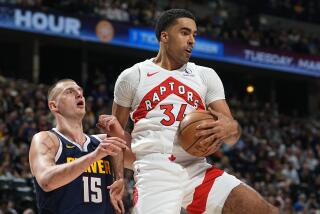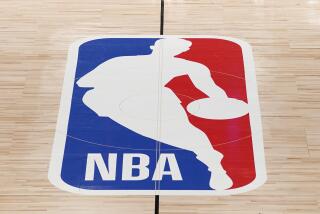Here’s a Tip-Off: NBA Will Start Season on Time
- Share via
Here’s the good news from Thursday’s talks between the NBA owners and the players they’ve locked out: Both sides are talking about testing and punishing for marijuana use.
Here’s the bad news: everything else.
David Stern is not a pessimist. During previous labor skirmishes the NBA commissioner would give you that knowing smile, which amounted to assurance that there would be no work stoppage in his league. No matter how badly negotiations were going at the time, Stern seemed convinced the league would get its business affairs straight long before time to tip off the season. And it always has.
That the league and its owners broke off negotiations Thursday because the owners didn’t like the union’s latest proposal is hardly a big deal. That Stern would later say, “I’m less optimistic today than I was yesterday” that the season will start on time in November is worth paying attention to, even after you factor in the spin.
What started out as (to use deputy commissioner Russ Granik’s words) a “freewheeling discussion” that Stern said went well and beyond posturing ended in a huff. In a conference call with reporters late Thursday afternoon, Stern and Granik suggested repeatedly that their conversation with a dozen or so players Thursday morning in no way reflected a Thursday afternoon proposal from union officials that the owners found “quite insulting,” Stern said.
In that same conversation, his most pessimistic words were also his most measured. “I’m saddened by this,” he said, adding that the two sides are going to have to negotiate a deal “whether it’s now, December, or whenever. ... The only question is how much damage is going to be done to this sport in the interim.”
I thought Stern was going to laugh off a question about a “drop dead” date for the 1998-99 season to be canceled. Instead, Stern agreed that the NHL’s Jan. 20 start to the 1994 lockout-shortened season was about as late a date as the NBA could start, too.
OK, no doubt Stern has to take this impasse as seriously as any labor dispute since the early 1980s. Because talking about a “hard” salary cap and doing away with the “Larry Bird Exception” are rather radical notions given the league’s success under those very guidelines in the 1980s and early 1990s. And the muted tone of Stern’s voice during a prearranged chat with reporters shouldn’t be kissed off as a ploy.
But. ...
I don’t believe for a minute, not yet anyway, that the NBA will miss one regular season game.
It’s not about who’s right or wrong; I’m not about to waste a minute of time assigning “right” or “wrong” to two parties squabbling over billions of dollars.
What I’m betting on is the majority of NBA players aren’t committed to missing a season. Or a portion of a season.
A great number of the NBA’s high-profile players are committed to one thing and one thing only: getting paid.
To do that, you’ve got to play.
Let’s face it, the notion of “sacrifice” has never been high on the agendas of the average ‘90s player. Becoming a great player in college wasn’t a priority. Hell, going to college wasn’t a priority. You think Kobe “Pass the ball? Me?” Bryant is about the good of the union? You think a guy like Penny Hardaway, who declares himself out for the season in March, has the stuff to tough it out for a couple of months without those $30,000 paychecks? Maybe it’s just me, but I don’t think the J.R. Riders and Derrick Colemans and Shawn Kemps have any concept of standing together for the good of the union or the next generation of ballplayers.
They’re in it to get paid. They’re in it to be famous, to have commercial endorsements, to live large. Players such as Buck Williams, Charles Barkley, Charles Oakley and Michael Jordan are just about extinct. And I don’t see any Curt Floods coming up behind them. Solidarity through thick and thin? I’ll believe it when I see it.
You see, all those $80,000 cars being driven by the stars, their boyz, mammas, cousins, flunkies, groupies, etc., have to be paid for. So do all the pagers, cell phones, road trips, custom-tailored suits, houses and apartments. And, I’m sorry to be so indelicate, child support payments. Can you say “lifestyle?” I don’t want to suggest that guys making an average of $2.6 million a year are living from hand to mouth, but there are a whole lot of guys making three times that much who’ll tell you very quietly after a drink or two that they have shockingly little to show for what they make.
You think Stern and the owners don’t know this?
The owners, who by the way have various other business interests from which to earn an income, will hunker down with a year’s worth of money from NBC and Turner Network if there is a long work stoppage. Sure, probably 100 guys couldn’t care less about missing a few paydays, but what about that increasing number of men making the league minimum ($272,000)? Think they’re gonna be rarin’ to miss two months of pay so Scottie Pippen can be assured of getting $20 million next year from the Chicago Bulls?
Personally, I find it kind of funny that management negotiated itself into this corner in the last agreement, to the extent that the players have this kind of lopsided advantage.
But I don’t want to hear this absurd notion being advanced by some of the players that they are now akin to “highly paid slaves.” If you make a billion in salaries, as the NBA players do now, and you can’t buy the damn plantation or start your own, you ought to be a slave.
Anyway, the best thing about the NBA starting on time -- besides the resumption of my favorite season -- would be that we don’t have to hear any more rhetoric or pessimism coming from either side.
More to Read
All things Lakers, all the time.
Get all the Lakers news you need in Dan Woike's weekly newsletter.
You may occasionally receive promotional content from the Los Angeles Times.








